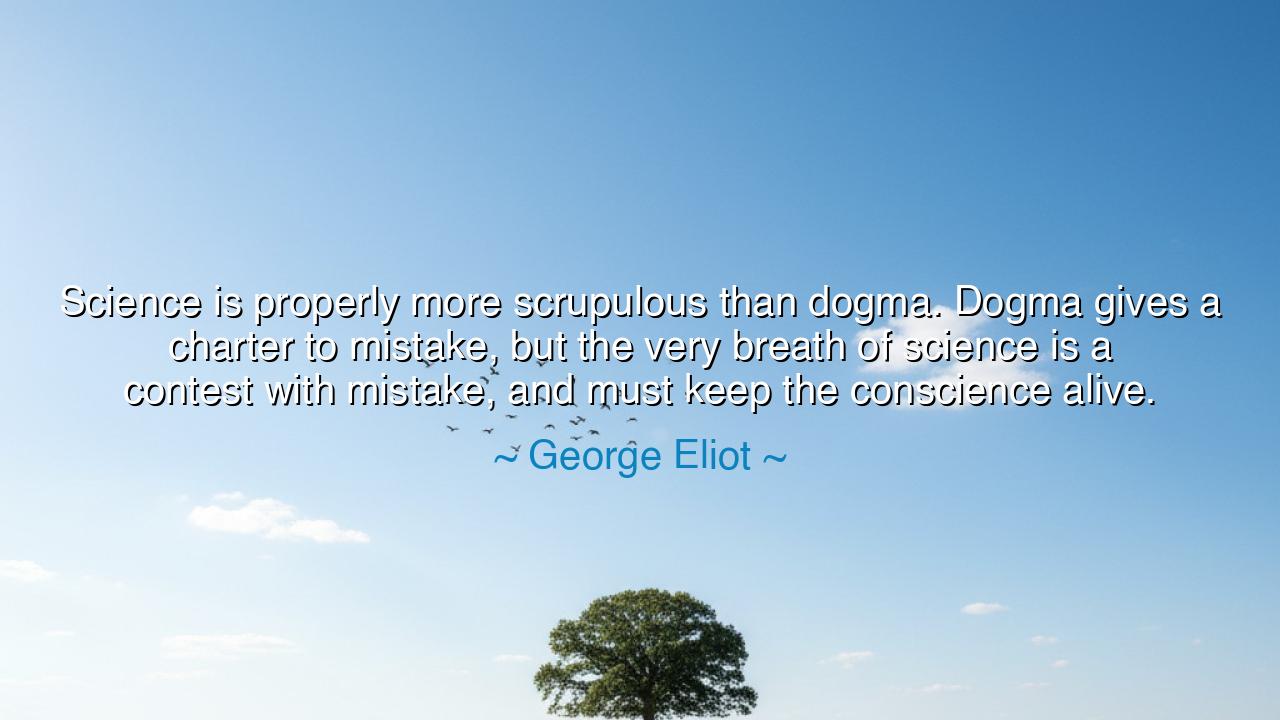
Science is properly more scrupulous than dogma. Dogma gives a
Science is properly more scrupulous than dogma. Dogma gives a charter to mistake, but the very breath of science is a contest with mistake, and must keep the conscience alive.






"Science is properly more scrupulous than dogma. Dogma gives a charter to mistake, but the very breath of science is a contest with mistake, and must keep the conscience alive." These words of George Eliot remind us of the profound difference between science and dogma—two forces that have shaped the course of human history. Eliot emphasizes that science is not content to rest in the comfort of accepted truths, as dogma does. Rather, the very essence of science is a contest with error, a relentless pursuit of truth that challenges assumptions and seeks to refine our understanding of the world. Unlike dogma, which grants an unquestioned authority to belief, science calls on us to keep our conscience alive, ever vigilant, ever questioning.
In the ancient world, philosophers like Socrates understood this distinction deeply. Socrates famously said, "The only true wisdom is in knowing you know nothing." His life was dedicated to questioning assumptions, to challenging the beliefs of the powerful and the common, and to pushing for deeper understanding. Socratic philosophy was not about adhering to fixed doctrines or accepting established dogmas, but about engaging in a constant contest with ignorance. Eliot's words echo the spirit of Socrates—the recognition that true wisdom arises not from certainty, but from a humble and scrupulous search for what is true, a search that never allows us to become complacent in the face of error.
Consider the example of Galileo Galilei, whose scientific breakthroughs in astronomy were met with fierce opposition from the Catholic Church. Galileo, through his telescope, observed the moons of Jupiter, proving the heliocentric theory that the Earth orbits the Sun. Yet, his findings clashed with the dogmatic beliefs of the time, which held that the Earth was the center of the universe. The Church’s refusal to accept Galileo’s discoveries, despite the overwhelming evidence, is a classic example of dogma giving a "charter to mistake." The Church, in its inflexible adherence to an outdated doctrine, denied the truth in favor of a belief system that held power and authority. Galileo’s challenge to this dogma, however, kept the spirit of science alive, and his commitment to questioning and refining the known truths of the universe ultimately led to a profound transformation in human understanding.
This confrontation between science and dogma is not limited to the past. In modern times, we see similar battles fought in the realm of medicine and public health. Consider the history of vaccination: when Edward Jenner first developed the smallpox vaccine in the late 18th century, his work was met with resistance from those who clung to the dogma of the time. Some argued that it was unnatural, or even dangerous, to introduce material from the cowpox virus into the human body. Yet, science—through rigorous testing and evidence—demonstrated that vaccination was the key to eradicating smallpox. The victory of science over the dogma of the time saved millions of lives and paved the way for the modern field of immunology.
Eliot’s words also underscore a crucial point: that science must remain in constant contest with mistake. It is not enough to uncover a truth; science must be ever vigilant, testing, questioning, and refining. The scientific method itself embodies this principle, requiring hypotheses to be tested, results to be scrutinized, and conclusions to be revised as new evidence comes to light. This process is an active engagement with error—an acknowledgment that we may be wrong, and that we must always be open to correction. Unlike dogma, which insists on certainty and finality, science thrives in the realm of uncertainty, ever pushing forward, ever questioning.
The lesson from Eliot’s quote is one of humility and vigilance. We must never fall prey to the comfort of certainty or the allure of belief without evidence. Whether in science, in our personal lives, or in our societies, we must be willing to challenge assumptions, to confront our errors, and to constantly test our beliefs. It is through this constant contest with mistake that we grow, not just as individuals, but as a society. Science is not a destination, but a journey—a journey that requires us to keep our conscience alive and to be ever mindful of the dangers of unexamined belief.
In our own lives, we must cultivate a spirit of inquiry and openness to new ideas. Just as Galileo and Jenner faced resistance, we too will face challenges as we seek to challenge the dogmas of our own time. Yet, like them, we must remain steadfast in our commitment to truth, no matter how uncomfortable or inconvenient it may be. Whether we are confronted with scientific discoveries, cultural norms, or personal beliefs, we must approach them with the same scrupulousness that Eliot describes. Science teaches us that the search for truth is not an easy one, but it is a journey worth undertaking—one that keeps our conscience alive and our minds ever open to the wonders of the world around us.






AAdministratorAdministrator
Welcome, honored guests. Please leave a comment, we will respond soon